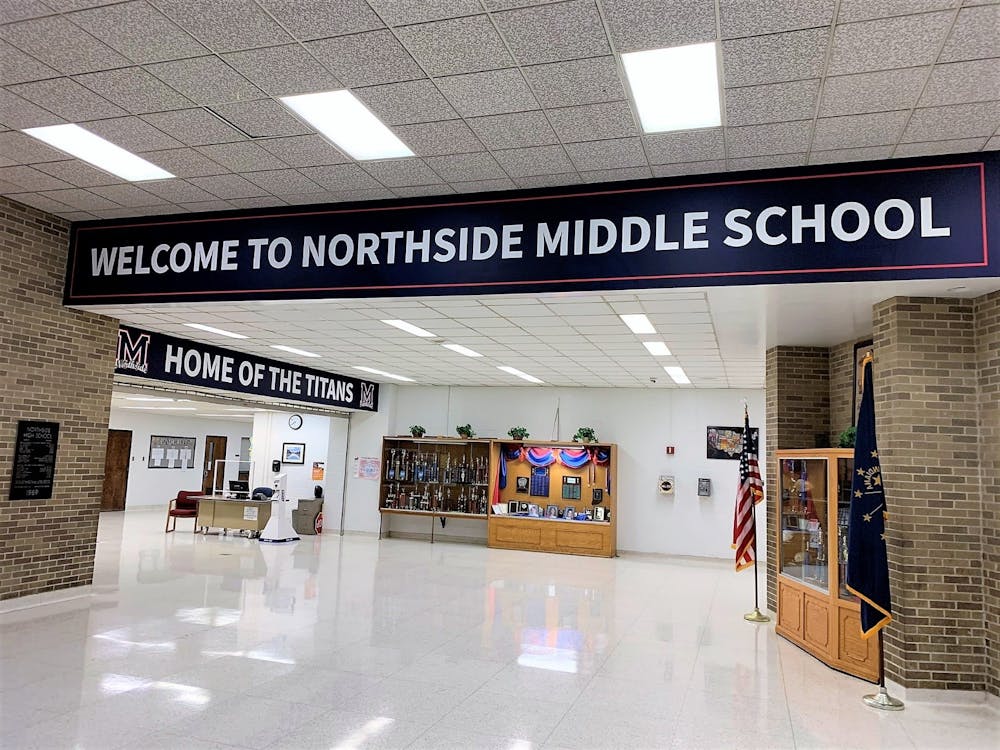Editor's Note: This story is part of The Partnership Project, a series of content written in an effort by The Daily News to follow the formal collaboration of Ball State University and Muncie Community Schools. Read more in this series here.
After one of the United States' more memorable presidential elections, Indiana congress members saw a need for expanding civics education.
House Bill 1384 received an almost unanimous vote, with 49-0 in the Senate and 88-1 in the House. Gov. Eric Holcomb signed the bill into law in April, declaring students in sixth, seventh or eighth grade are required to take a semester-long civics course starting in the 2023-24 school year. The requirement applies to all public and charter schools, as well as private schools accredited by the state.
Indiana students usually take government courses in high school, but state legislators are hoping to emphasize civics knowledge and participation earlier in students’ school careers. Republican Rep. Anthony Cook from House District 32 was inspired to author this bill from his experience as a government teacher and former superintendent of Hamilton Heights School Corporation.
“Recent times and events have shaken and tested our democratic standards and practices, and it is our duty to work hard to keep and reinforce our democratic principles, and to train our students to understand and embrace our form of government,” Cook said at a Feb. 18 press conference.
Cook introduced the bill Jan. 14 with his coauthors — Republicans Jeffrey Thompson, Robert Cherry and Donna Schaibley.
The State Board of Education, along with the Indiana Department of Education, has until July 1, 2022 to establish standards for the class, leaving school districts with one year to implement the course.
While staff members are still working to schedule meetings with state officials, Northside Middle School Principal Eric Grim said most of his teaching staff is already preparing for the change.
“It’s something that’s very positive, I think it’s something we’re looking forward to,” he said. “It’s an exciting thing for our kids. This has some good possibilities to teach our kids the democratic process, what it means to be a good citizen, preparing to vote and all those things we want of our population.”
Grim said Muncie Community Schools district administrators, middle school leadership and social studies teachers will develop a plan together for the curriculum and implementation of this required course. Middle schools across Indiana will be awaiting guidance from state officials on what specific content needs to be covered and the protocol for students needing to pass the civics course to enter high school.
Chad Kinsella, Ball State assistant professor of political science, said this course requirement might be difficult to implement because teachers already have many expectations to meet.
“I’m sure the school districts are not overly excited about it due to this being something else they’re being told that they have to do,” he said. “One of my really good friends, who’s a history teacher, is really annoyed when this stuff happens because he already has a plan for his classes and now, he’s going to have to change up his curriculum to fit this requirement.”
Kinsella also echoed Grim’s sentiment that this law will provide students with more knowledge on the workings of the United States’ government system and hopefully encourage them to vote in elections when they are older.
For teachers’ sake, Kinsella said, he hopes the class will be offered as a two-semester course so they don’t have to rush through any important lessons, but he is happy Hoosier students will have the opportunity to learn more about American history and government.
“I like to tell my [POLS] 130 class that there’s still a small percentage of people who can actually pass the test that’s administered to people who are becoming naturalized U.S. citizens,” Kinsella said. "The rationale for why the act got passed could be because a lot of American citizens don’t know a whole lot about the government history of the United States.”
Pamela Schaal, associate professor of political science, said civics education in middle school is important for students to understand different political opinions and develop their own arguments.
“I think that it is important for students to be exposed to civics education at an earlier age since our society is overwhelmed by news from the 24/7 news stations [and] the stories that are continually popping up on our phones,” she said. “With an incredibly polarizing political environment, the comprehensive study of government and learning to appreciate both sides of the political spectrum has never been more critical.”
Contact Dorian Ducre with comments at dkducre@bsu.edu or on Twitter @DucreDorian.





